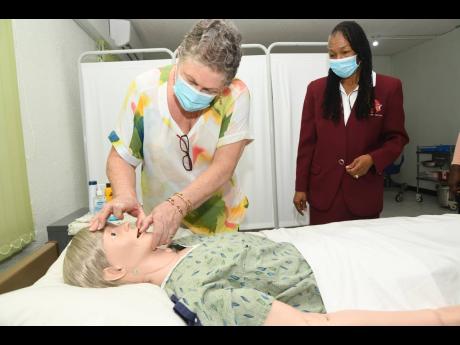COVID SCARE - Anxiety rises among elderly as deaths hit seniors hard
Many of the country’s 350,000 senior citizens are reportedly living in fear as they try to escape the creeping clutches of COVID-19.
Jamaica recorded 74 new positive cases on Thursday and two additional deaths, bringing fatalities to 40.
Among the deceased over the last 48 hours have been a 90-year-old man from Kingston and St Andrew, and two St Catherine residents, a 77-year-old woman and a 61-year-old man. All three reportedly suffered from underlying illnesses or disorders such as diabetes, renal disease, hypertension, and high cholesterol.
Director of the Mona Ageing and Wellness Centre at The University of the West Indies, Professor Denise Eldemire-Shearer, is concerned about the increasing susceptibility of the elderly, with more than half of Jamaica’s COVID-19 deaths among persons 70 and over.
“They are afraid, and the death rate among the elderly gives them reasons to be afraid,” she told The Gleaner on Thursday.
Eldemire-Shearer said that although the Government stipulates that the elderly can leave their houses to go to the pharmacy and to seek medical attention, some are so gripped by fear that they refuse to go out to have their prescriptions filled.
On Monday, Prime Minister Andrew Holness revised upwards a stay-at-home order, from 75 to 70, restricting movement for the elderly.
The emerging domestic crisis for the elderly – which follows global trend lines showing them at greatest vulnerability to the new coronavirus – is becoming more evident, the expert on ageing said, as some seniors have asked their nursing aides to halt visits entirely. Anecdotal reports show that those refusals are more frequent in urban populations, which are declining visits to limit the risk of spread with Jamaica in community-transmission phase.
“They were told, don’t let anybody in. Some of them stopped their helpers, not just nursing aides, because of the issues around public transportation,” said the professor, a leading voice of advocacy on ageing.
Six hundred and thirty-nine, or 62 per cent, of Jamaica’s 1,027 active coronavirus cases, between August 27 and September 10, are in the urban-dense parishes of Kingston, St Andrew, and St Catherine. St James has 38 cases.
STAY AT HOME
Eldemire-Shearer, former chairman of the Caribbean Community of Retired Persons, agrees with the Government’s stay-at-home order, which allows for travelling for food and medicine, and to exercise, but is worried about the tangential effects of limited mobility.
Homebound seniors who are not getting exercise are at increased risk of losing muscle mass, but it is the psychological impact that concerns Eldemire-Shearer the most.
“We are seeing a lot of anxiety. I wouldn’t call it depression yet, but the descriptions we are getting is, ‘We are not in control,’ and you know how old people like to be in control,” she said.
The return of more employees to workplaces in June – a stark contrast to the frigid economy five months ago – has also left many seniors unsupervised during the second, more fatal wave of the pandemic, which has killed 911,000 people globally. Worldwide infections have topped 28 million.
Nursing homes have been ordered not to allow family visits to limit the risk of spread of the coronavirus, but some operators have been finding creative ways to get senior citizens to connect with relatives.
“The nurses in the homes, the practical nurses, are using their own phones for video chats to the relatives who cannot come in and they are playing more games,” the professor said.
Eldemire-Shearer is urging families to ensure that elderly relatives are getting sufficient stimulation.
“It is really for families to try and motivate them to do a little bit more exercise, and exercising not in the sense of gym, but just walking and finding ways to stimulate them because they are sitting around doing nothing,” she said.


